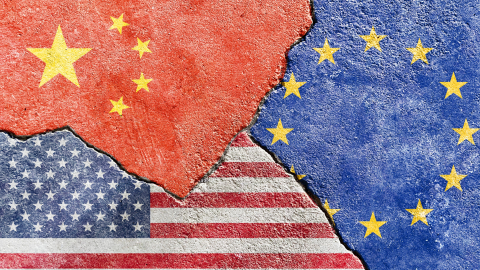Nationalism in China and Japan and Implications for Bilateral Relations
Nationalism appears to be an important part of the growing frictions between China and Japan.
In Japan, the return to power of Shinzo Abe as prime minister, and the historic breakthrough of an extreme right-wing party onto the political scene reinforce the view that there has been a clear shift to the right. Public opinion is today also more realistic about direct security threats to Japan.

The United States - South Korea Military Alliance in Question
The alliance born of the Korean War trades the assurance of security for Seoul with a certain alignment with Washington.
Regional Integration Within Greater China – State of Play and Future Prospects
Although the Greater China region is often said to constitute an increasingly well-structured economic player, a systematic analysis of intra-regional interactions is not readily available. This chapter seeks to fill this gap.
The Umbrella Revolution and the Future of China-Hong Kong Relations
In this article, Willy Lam argues that the events of recent weeks represent a turning point in China-Hong Kong relations. The author analyses the multiple facets of the movement in Hong Kong and Beijing's response.
Gas Strategy of China: Developing competion between national production and imports
The Chinese gas market is facing four key challenges and the government is elaborating responses which will have implications for the Chinese and world energy markets:

Disputes in the South China Sea: Troubled Southeast Asian Waters
The strategic position and economic value of hundreds of small islands in the South China Sea have provoked claims of sovereignty from most of the neighboring states.

Abe’s Japan and Xi’s China: from Cold Peace to Hot War?
Sino-Japanese relations have deteriorated since Shinzo Abe and Xi Jinping came to power.

China’s Role in Multilateral Economic Institutions, between Revisionism and Status Quo
China, now the world’s second largest economy, is going to play an increasingly substantial role in multilateral economic organizations and mechanisms.

Asia-Pacific: China’s Foreign Policy Priority
China is increasingly active in the Asia-Pacific region, an area that makes up the main focus of its foreign policy.

Support independent French research
Ifri, a foundation recognized as being of public utility, relies largely on private donors – companies and individuals – to guarantee its sustainability and intellectual independence. Through their funding, donors help maintain the Institute's position among the world's leading think tanks. By benefiting from an internationally recognized network and expertise, donors refine their understanding of geopolitical risk and its consequences on global politics and the economy. In 2024, Ifri will support more than 70 French and foreign companies and organizations.












